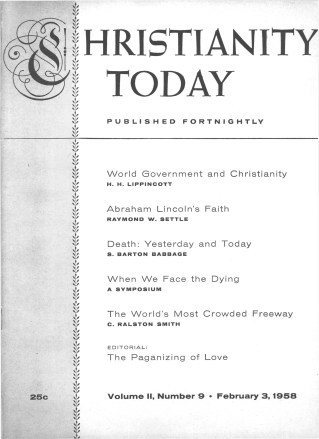The next day John seeth Jesus coming unto him, and saith, Behold the Lamb of God, which taketh away the sin of the world (John 1:29).
When our Lord was thus set forth by John, it is well to note the special character under which he was declared. John knew much of the Lord Jesus, and could have pictured him in many lights and characters. He might have especially pointed him out as the great moral Example, the Founder of a higher form of life, the great Teacher of holiness and love. Yet this did not strike the Baptist as the head and front of our Lord’s character, but he proclaimed him as One who had come into the world to be the great Sacrifice for Sin.
The principle office of Christ is briefly but clearly stated: that he takes away the sins of the world by the sacrifice of his death, and reconciles men to God. There are other favours, indeed, which Christ bestows upon us, but this is the chief favour, and the rest depend on it; that, by appeasing the wrath of God, he makes us to be reckoned holy and righteous. For from this source flow all the streams of blessings, that, by not imputing our sins, he receives us into favour. Accordingly, John in order to conduct us to Christ, commences with the gratuitous forgiveness of sins which we obtain through Him.
Lamb Of God
The article denotes the appointed Lamb of God, which, according to the prophetic utterance presupposed as well known, was expected in the person of the Messiah. This characteristic form of Messianic expectation is based upon Isa. 53. Comp. Matt. 8:17; Luke 22:37; Acts 8:32; 1 Pet. 2:22 ff.; and the Lamb in the Apocalypse.
H. A. W. MEYER
As the lamb was sacrificed upon the altar, as a symbolical atonement for the sins of the people, this epithet is applied figuratively to our Lord Jesus Christ, to denote the sacrifice which he made for the sins of men. That John so intended the expression to be understood, is evident from the words which follow, which taketh away. This shows that Jesus was not called a lamb, to denote merely that he was an innocent and harmless man, or from any analogy existing between him and the paschal lamb, which was the sign of deliverance from Egyptian bondage; nor was he thus called, with any reference to the lamb of the daily evening and morning sacrifice, for this was only one of the several animals which were offered on such occasion.… Christ was indeed typified in the paschal lamb and in all the sacrificial ritual, but the Lamb of God is here used in a higher and more significant sense, as the Lamb previously referred to in the Messianic prophecies.
JOHN J. OWEN
It is a testimony that stands as a heading to the whole series or class of similar sayings which represents the Lord Jesus as bearing our sins in His own body.… The identification of the Lamb of God with Jesus of Nazareth was the only thing in this testimony of the Baptist specifically new; and He is called the Lamb of God, just as He is styled “the Bread of God” (John 6:33), partly because He was graciously provided by God, partly because He was the truth of the types, or the reality of what was foreshadowed by the Lamb in the old economy; or, it may be, the Lamb that belongs to God—that is, which is to be offered as a sacrifice to Him.
GEORGE SMEATON
Taketh Away
He is said to be “the Lamb that taketh away the sins of the world; not hath taken, or will take, but taketh, which notes, actum perpetuum, the constant effect of his death.
STEPHEN CHARNOCK
The verb rendered taketh away, refers to the removal of sin or its penalty, by an atonement or expiation. It is the word chosen by the LXX to translate pardon (i.e. put away) my sin, in 1 Sam. 15:25, and to bear the iniquity, in Lev. 10:17. How could the sin of the world be revoked in any other manner? Could it be effected by the death of a merely good man? Surely not. Strict and perfect obedience is required of every created intelligence, and no one therefore, however good he may be, has any stock of merit which can be transferred to the account of another. But a suitable expiation has been made, and Jesus Christ, who a little before was averred to be the Incarnate Word, who in the beginning was with God, and who was God, and by whom all things were created, is here declared to be the Being, through whose blood shed like that of the lamb upon the altar, the expiation has been effected.
JOHN J. OWEN
The full meaning of the expression, o airon, is scarcely brought out in our authorized translation. The Greek verb, airo, like its Hebrew equivalent nasa, primarily signifies “to lift up”; and, secondarily, “to carry away,” as one lifts up a burden, and then removes it to another place. No doubt it may be translated “to take away”; but it strictly means to take away in one particular manner—namely, by bearing or carrying the thing that is taken away. As used in this passage it is highly significant, implying that Christ took upon himself the burden of our sin, and in this way removed it from us. The expression, indeed, as thus applied, is figurative. But it is not on that account to be stripped of its obvious meaning.
THOMAS J. CRAWFORD
Sin Of The World
Here is no ground at all for universal redemption; for the word world, standeth here in opposition to the Jews, as this very evangelist himself explaineth it (1 John 2:2): “And he is the propitiation for our sins, and not for ours only (of the Jewish nation) but also for the sins of the whole world”; and of men of other nations; and so he meaneth here—that “Christ is the Lamb of God, a sacrifice, not for the Jews only, but for the Gentiles, and other nations also.”
JOHN LIGHTFOOT
And when he says, the sin of the world, he extends this favour indiscriminately to the whole human race; that the Jews might not think that he had been sent to them alone. But hence we infer that the whole world is involved in the same condemnation; and that as all men without exception are guilty of unrighteousness before God, they need to be reconciled to him. John the Baptist, therefore, by speaking generally of the sin of the world, intended to impress upon us the conviction of our own misery, and to exhort us to seek the remedy. Now our duty is, to embrace the benefit which is offered to all, that each of us may be convinced that there is nothing to hinder him from obtaining reconciliation in Christ, provided that he comes to him by the guidance of faith.
JOHN CALVIN
Like most of the terms for sin, this term, too, is negative, “missing the mark,” i.e., the one set by the divine law, missing it by thought, word, or deed, by our very condition which is corrupt by nature. As many men as there have been, are now, and will be in the world, each with his daily life stained with many sins, so many individual masses of sin are formed, and all these masses are combined in one supermass, “The sin of the world.” We may unfold this collective by taking the law and dwelling on all the many kinds, types, forms, and effects of sin. Again we may set forth the deadly, damning power of a single sin, and then multiply this power a million fold and again a million fold. Yet we should not make the rather specious—merely abstract—distinction between the “sin” itself and the “guilt” of sin, for sin exists nowhere apart from its guilt, and guilt nowhere apart from its sin. The same is true with regard to “sin” and its “consequences.” As the guilt inheres in the sin, so the consequences stick to the sin, closer than a shadow. Neither the guilt nor the consequences are taken away, really taken away, unless the sin itself is taken away. With the sin also its guilt and consequences are cancelled.
R. C. H. LENSKI
Men are willing to accept Christ as most anything except as Saviour; but Christ is not willing to be accepted as anything less than a Saviour. He is a Priest that he may offer sacrifice for a lost race; he is a Teacher that he may teach men the way of salvation; and he is a King in a kingdom of saved souls. If we will not accept him as the Lamb of God, we have no part with him. The Jews were ready to accept him as a political Reformer, but he refused such an office. Many nowadays are ready to accept him as the Leader of all sorts of social reforms, but they and all men must take him as their Saviour or not at all.
W. A. CANDLER
There are only two places where sin can be—either it is with thee, to lie upon thy neck, or it lies on Christ, the Lamb of God. If it lies on thy shoulders, thou art lost; but if it rests on Christ, thou art quit of it, and art saved.
MARTIN LUTHER










